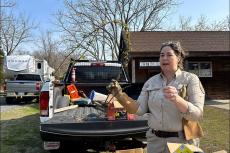As the Omicron variant continues to spread like fire through dry leaves, ravaging family get-togethers and leading to record daily case numbers across the country, many of us are once again struggling with a sense that this pandemic will never end. History tells us this isn’t the case, that this pandemic, like all of the others that have come before, will eventually cease and life will return to some semblance of “normal.”
Here in the days between Christmas and New Year’s, as I spend time listening to my friends and family who work on the front lines of this pandemic as doctors, nurses, technicians, pharmacists, chaplains, and so much more, I worry more and more about what normal will look like for us, and what we will carry out of this pandemic. As pundits and anti-vaxxers promote approaches to Covid-19 that lack evidence, as health care workers are assaulted in parking lots and emergency rooms for begging our patients to be vaccinated or refusing to prescribe treatments whose efficacy has not been proven, I know that the damage done to my profession will be something we carry for decades.
I’m one of the fortunate ones, in so many ways. Almost all of the patients I care for are working so hard to do their parts in this pandemic to keep everyone safe. They’re wearing masks diligently, vaccinating and boosting themselves and their families as quickly as they can, asking thoughtful questions and listening to the answers, and offering care and compassion for the burdens I and my colleagues have faced. Even the ones who are skeptical about vaccines and the Centers for Disease Control’s recommendations still take time to meet me where they can to listen, and I am grateful for that.
It does not change the fact that sometimes when I close my eyes, I am still standing in a Covid Intensive Care Unit listening to the chorus of ventilators and feeling that same sense of powerless frustration. It does not mean that I don’t hear the overwhelming exhaustion in the voices of my friends and family every time we talk on the phone about another patient lost or another inadvertent exposure.
The pandemic will end, we tell ourselves, but it is not over yet. Variants continue to rise, for a number of reasons, but not least among them is that every time there is an ebb in cases, the understandable urge to rush back toward normalcy leads many to return to large gatherings or abandon masks before it is safe to do so. I fear as well that the seemingly unending parade of variants that we have made it through up to now also entrench the opinions of the unvaccinated: that somehow, the sense of having made it through the original version, the Delta variant, and now Omicron may make those who choose to remain unvaccinated more confident in their decision to stay so.
But the evidence, the facts, prove the fallacy in this thinking. The overwhelming majority of those who are becoming seriously ill and requiring hospitalizations and ending up in I.C.U.s remains those who are unvaccinated. Yes, we are seeing some more serious cases among the vaccinated, but even those are primarily among those who have severe risk factors and/or have not received a booster vaccination, and even these pale in comparison with the rates of serious infection among the unvaccinated.
A year into the vaccination campaign, there is no doubt that they work and are safe. There is no doubt masks work. As the wave of Omicron infections continues to crest, a weary and scarred health care work force will continue to do everything we can to stand between the wave and those we care for, but the burdens we carry grow heavier and heavier every day.
As this year comes to a close, I am once again begging everyone to continue to take every precaution they can to keep themselves and those they love safe: every new vaccination, every booster, every large group gathering avoided, every diligent attempt to be tested and isolate when symptomatic that the public can take helps bring us one step closer to returning to normal.
—
Joshua Potter, D.O., a physician with Stony Brook Southampton Hospital’s Meeting House Lane Medical Practice, oversees the practice’s Shelter Island office. He specializes in family and neuromusculoskeletal medicine. Opinions expressed in this column are his personal and professional views and not necessarily those of his employer.




